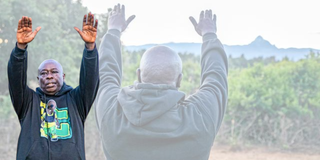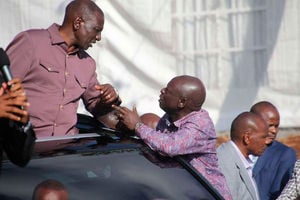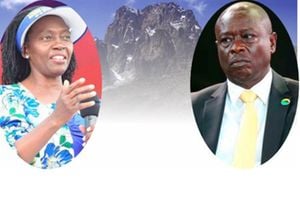
As Gachagua goes through the Dr Karanja moment, it is apparent that he failed to read the Nyayo history. They lost their way in the mountain of politics.
By the time Rigathi Gachagua and Dr Josephat Karanja ascended to the nation’s coveted second-in-command position — just a whisper away from the presidency — they were, in essence, political novices.
Neither had spent enough time in the hallowed halls of Parliament to grasp the intricate dance of patience that defines Kenyan political theatre. Politics, after all, is the art of managing consensus, cultivating alliances, and knowing when to strike. Yet, in their meteoric rises, both Gachagua and Dr Karanja appeared to torch these essential bridges.
Should Gachagua fall, and with the majority of MPs seemingly sharpening the axe, his trajectory would mirror that of Dr Karanja — a man whose spectacular political downfall was as dramatic as his Vesuvian ego. Dr Karanja’s downfall brought a crashing halt to the ascent of a man whose ambition knew no bounds. For Gachagua, his fate, his detractors claim, is sealed by a potent cocktail of hubris and ill-advised outbursts — destructive behaviors that may be the final nails in his political coffin. That is unless he has a secret card.
Unlike Gachagua, whose University of Nairobi Bachelor of Arts in Literature reflects a different intellectual path, Dr Karanja was a distinguished historian. A Princeton graduate with a PhD earned in 1962, his thesis, United States Attitude and Policy Toward the International African Association, 1876-1886, demonstrated a keen intellect and depth of knowledge.
His rise in Kenya’s political and academic circles was equally swift. By the age of 30, he was dispatched to London as Kenya’s first High Commissioner before returning to become the inaugural Vice Chancellor of the University of Nairobi. Notably, however, his appointment to that role was less about merit and more about political manoeuvring by the so-called ‘Kiambu Mafia’, who sought to block the ascension of the more qualified Prof Bethwell Ogot. As Prof Ogot himself noted in his memoir My Footprints on the Sands of Time, Dr. Karanja “had virtually no experience in university administration, not even at the departmental level”.
Kanu regime
One could draw parallels between Dr Karanja and Gachagua in this regard. However, both had used the grounds of the University of Nairobi as their entry point to politics. Gachagua had exploited Moi’s tribalisation of student leadership and was once the leader of the Nyeri District University Students Association (Ndusa) and the chairman of Literature Students Association. At the later, he was caught up in a cash row with literature students after a visit to Kabarnet Gardens to see President Moi. It was by organising student trips to Moi’s Kabarnet home that he became part of the District Officers appointed as an appreciation of the loyalty to the Kanu regime. His era as a DO was as dramatic and included harassment of the opposition members of Parliament when he served in Kiambu District.
The tale of how Gachagua drifted apart from nearly all the UDA MPs is a paradox wrapped in political intrigue. Once a trusted lieutenant of President Ruto, he has now emerged as the emblem of UDA’s internal discord, his downfall a direct result of a tongue too sharp for his own good. Power, it seems, swept over him like a heady wine, blurring the line between confidence and recklessness, until he found himself intoxicated beyond the point of political sobriety.
Dr Karanja was equally rich – though he had not reached the levels enjoyed by Riggy G. When the debate started about a ‘kneel-before-me” politician, Dr Karanja was accused of importing three million gunny bags and thus killing the local industries. He was also accused of being bank-rolled by a foreign country. At best, he said nothing – and at worst, he ignored the noise. Mistake Number One.
Ethnic strongholds
When Gachagua first faced criticism from figures like Oscar Sudi, he believed he had the defences necessary to protect himself. However, as the political dynamics shifted, Mt Kenya MPs Mwangi Kiunjuri and Kimani Ichung’wah began to mobilise the region’s political landscape without him. With his base of MP supporters steadily shrinking, Gachagua increasingly withdrew into his ethnic stronghold — a vulnerable position that exposed him to accusations of ethnic supremacy. His stature as a national leader was easily eroded.
Ever since he became the deputy president, Gachagua has been insisting that only UDA loyalists should get State appointments. At one point, Dr Karanja was accused of tribalism and demanding 40 per cent of all vacant slots at the Nairobi City Commission, which ran the city. His nemesis, Arthur Magugu, said: “When you see that list, you will find that it is a shame. Yet, here is a gentleman who professes to be a national leader.” Magugu then turned to Dr Karanja and said, “Mr Vice-President, project a national outlook. It is not one tribe that will lead this country to any greater heights… it is Kenyans who will do this.”
Dr Karanja again found himself in the crosshairs of the political establishment due to his efforts to unite the Gikuyu, Embu, and Meru communities — an endeavour that was perceived as an attempt to cultivate his own power base. To President Moi and his inner circle, this move raised red flags. When Mwea MP Kathigi Kibugi accused Dr Karanja of sowing discord in Central Province and argued that, as a leader, he should foster unity, Magugu, a staunch Nyayo loyalist, swiftly countered: “(Dr Karanja) is not the leader of Central Province. He is not. The leader of Central Province is the President himself. Therefore, the Vice-President and Minister for Home Affairs has no business with that, and he is not supposed to do that.”
The same was said about Gachagua as he started boasting how Mt Kenya was receiving more appointments than other regions – and as he tried to tout himself as the kingpin. For Dr Karanja, he chose to overlook the growing influence of Kuria Kanyingi, a brash Nyayo loyalist flaunting vast amounts of unexplained wealth. Kanyingi, a motor vehicle inspector, strategically directed his endless stream of money towards churches and women’s groups, ensuring his presence in the community. Every weekend, the state broadcaster reserved a camera for him, ready to capture his appearances at various events. His attack on Dr Karanja would soon be his weekend pastime. But Dr Karanja, perhaps naïve of how President Moi organised downfalls, failed to read the signs of the time. His defence was that “money had been poured” to finish him. Like Gachagua, he seemed to have no experience on how to evade political turbulence.
Immense family wealth
Before being chosen as President Ruto’s running mate, Gachagua, a mere one-term MP, was more renowned for his entrepreneurial ventures than for any remarkable political prowess. His initiation into the world of lucrative tenders came from his brother, Nderitu Gachagua, a former Public Works quantity surveyor who amassed millions while still a civil servant. Nderitu later transitioned into politics, becoming Mathira MP and Nyeri's first governor, solidifying the Gachagua family’s immense wealth — largely built on the multi-million-shilling government contracts they secured.
By 2022, Rigathi Gachagua’s declared wealth stood at Sh800 million, but eyebrows were raised recently when scrutiny revealed that within just two years, his assets had allegedly ballooned to Sh5.2 billion, despite earning a modest salary of Sh12 million. With his impeachment looming, has since attempted to revise his wealth declaration to Sh12 billion, but the inquiry into the true source of his fortune promises to be intriguing.
The most fascinating aspect is that Gachagua is now being betrayed primarily by his Mt Kenya allies. It was Gachagua — along with, to a lesser extent, Moses Kuria — who were instrumental within UDA in attacking the Kenyatta family, framing them as the root of Kenya’s inequalities, while casting themselves as the “humble” sons of Mau Mau. Gachagua leveraged his past closeness to Uhuru, having once served as his personal assistant, to tarnish the former President’s reputation while promoting the “Hustler” narrative. His considerable wealth, coupled with his boldness to intimidate, became his primary political currency.
If President Ruto wants to follow Moi’s footsteps of appointing academics into his circle, then Prof Kithure Kindiki is fitting within the game-plan. But there is a history to it. Dr Karanja was among a cadre of academics that President Moi brought into government to mask the intellectual mediocrity within the ruling Kanu regime. Alongside Dr Karanja were luminaries like Prof George Saitoti, Prof Philip Mbithi, Prof Samson Ongeri, and Prof Jonathan Ng’eno, among others. Yet, despite their esteemed credentials, Moi never truly trusted them. Instead, he leaned heavily on a close-knit circle of loyalists from Kabartonjo, revealing the underlying mistrust that pervaded his leadership.
As Gachagua goes through the Dr Karanja moment, it is apparent that he failed to read the Nyayo history. They lost their way in the mountain of politics.
@johnkamau1











